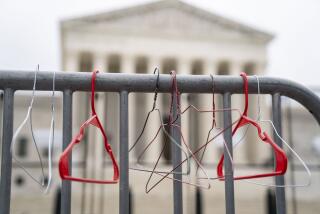Democrats May Compromise on Judicial Fight
- Share via
WASHINGTON — Senate Democratic leaders said Monday that they were willing to consider a compromise with Republicans that would defuse a potential confrontation over judicial appointments.
Minority Leader Harry Reid (D-Nev.) and Minority Whip Richard J. Durbin (D-Ill.) said that under such a deal, Democrats would allow a vote on some of President Bush’s seven controversial nominees to the federal bench, while others would be withdrawn by the White House.
The Democrats stressed that any deal would have to include a pledge by the GOP leadership not to try to change Senate rules that allowed for filibusters of judicial nominees.
“I would rather dance than fight,” Reid said of the prospect of a compromise. “I want to do everything I can to avoid” a showdown over the filibuster.
The comments by the two Democrats represented the first time they publicly endorsed the outlines of the compromise, which had been the subject of private discussions with Republicans for weeks.
Both sides in the dispute say no formal deal is on the table. And Republicans have given no public indication they would accept such a compromise.
If the GOP follows through on threats to prevent filibusters of judicial nominees, Reid and Durbin vowed Monday to force Republicans to spend time voting down Democrat-proposed bills.
The two Democrats said that contrary to Republican assertions, they did not plan to shut down the chamber’s business if the filibuster rule was abolished.
Instead, Reid and Durbin said they would use Senate procedures to force votes on 13 Democrat-proposed bills, including measures aimed at lowering gas prices, raising the minimum wage and reducing unwanted pregnancies.
“If Republicans go ahead and break the rules, Democrats are going to use the rules to fight for relief at the gas pump, stronger schools, lower healthcare costs and a range of other issues important to the American people,” Reid told reporters.
The potential GOP push to ban the filibuster for judicial nominees has been described by many as the “nuclear option” because of the political discord it could spark.
The comments by Reid and Durbin were part of the escalating fight between the two parties for public support on the filibuster issue, with each maneuvering to cast the other in a bad light.
“We are not going to shut down the government. That’s what happened under [former Republican House Speaker] Newt Gingrich,” Durbin said, referring to the 1995-96 budget battles between Gingrich and President Clinton.
The public largely blamed Gingrich and the GOP for the government shutdown.
“I’m not Newt Gingrich,” Reid said. “We’re not going to close down the Senate. Far from it, we’re going to have a very active Senate.”
In response, Republicans suggested Democrats were backtracking, citing a letter from Reid to Senate Majority Leader Bill Frist (R-Tenn.) on March 15 saying that if the filibuster rule was changed, Democrats would “be reluctant to enter into” even the routine agreements that facilitate action in the Senate.
Democrats used filibusters during Bush’s first term to block 10 of his nominees to the federal bench. Bush has resubmitted seven of the nominees, sparking the dispute over the filibuster -- a tactic in which debate is used to block a vote.
It takes 60 votes to end a filibuster; the Republicans hold 55 seats in the Senate. Under the rule change the GOP is considering, Bush’s nominees would need 51 votes to win confirmation.
As the rhetoric rises on both sides, Republicans have sought to focus public attention on what they consider Democrats’ inappropriate use of the filibuster.
In a speech Monday in New York, Frist said that for 70% of the 20th century, the same party controlled the White House and the Senate.
But he said that during those periods, “no minority [party] ever denied a judicial nominee ... an up-or-down vote on the Senate floor” when it was clear the nominee enjoyed majority support.
Democrats counter that Republicans used different tactics to stall some of Clinton’s judicial nominees. They also argue that eliminating the filibuster would violate the constitutional checks and balances among the three branches of government.
And they object to assertions by Christian activists that the filibusters are aimed at judges with strong religious views.
“We believe it’s a constitutional issue,” Durbin said. “It’s not a matter of filibustering people of faith. It’s a matter of having faith in the Constitution.”
More to Read
Get the L.A. Times Politics newsletter
Deeply reported insights into legislation, politics and policy from Sacramento, Washington and beyond. In your inbox twice per week.
You may occasionally receive promotional content from the Los Angeles Times.










